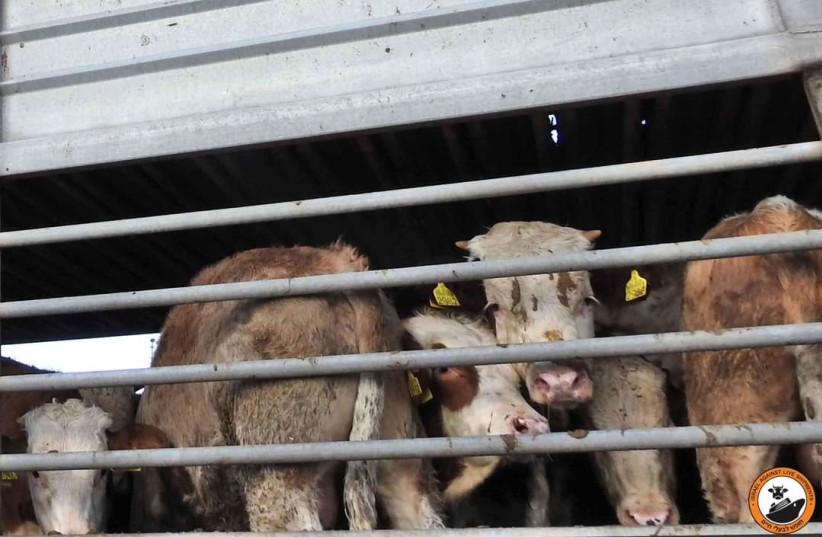Israel imported 750,000 live calves and lambs during 2023, making it the third highest amount of live animals imported in recorded history, according to the Israel Against Live Shipments NGO.
The organization released a report exclusively to The Jerusalem Post on Wednesday underscoring the volume of live animal imports into the country. The report revealed a decline in imports compared to the record years of 2022 and 2021 but still surpassing the figures from 2014 to 2020. Notably, there has been a significant 220% increase between 2014, when only 228,711 calves and lambs were imported live to Israel, and this year.
Increase in live animal imports
In 2022, Israel imported 925,440 live calves and lambs. In 2021, it imported 856,630.
While many countries are discontinuing the practice of live animal shipments for slaughter, including neighboring Jordan, Israel continues to import animals for slaughter on a massive scale.
"It pains me greatly to see that already on October 8, the day after the terrible disaster, a live shipment vessel had already arrived in Israel, followed by dozens more," said Yaron Lapidot, who helped initiate Israel Against Live Shipments' Freedom For Animals campaign. "No disaster, no war stops this cruel death industry."

According to Israel Against Live Shipments, every year, hundreds of thousands of animals are transported to Israel for fattening and slaughter. They come on sea voyages from Europe and Australia on overcrowded ships, often without enough food and water. The conditions can expose the animals to diseases and cause environmental pollution, both risks to public health.
"Occasionally, cases are documented of live animal carcasses being thrown from ships onto the shores of Israel with the animals in poor health and suffering from contaminated injuries and more," the organization explained.
In 2023, there were at least 10 documented cases like this.
The animals traditionally come to Israel on ships from Portugal, Romania, Hungary, Lithuania, France, Serbia, and Australia. This year, however, animals also started coming from Ireland. Israel Against Live Shipments said that little is known about the transport conditions from Ireland.
A report by Human Behaviour Change for Animals done with some support from Israel Against Live Shipments found that the transport of animals is neither economical nor ecological. It also showed that while meat consumption in developed countries is decreasing, the export of live animals to developing countries is growing.
Specifically, the report showed that importing frozen or chilled meat from Portugal is less polluting and more economically viable than importing important live animals.
The organization has worked with partners on legislation to reduce the importation of lambs. Eventually, importing them would be phased out. That legislation is expected to be presented to the Knesset shortly by MK Yitzhak Kroizer of the Otzma Yehudit Party.
The Environment and Climate Change portal is produced in cooperation with the Goldman Sonnenfeldt School of Sustainability and Climate Change at Ben-Gurion University of the Negev. The Jerusalem Post maintains all editorial decisions related to the content.
